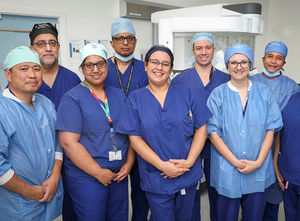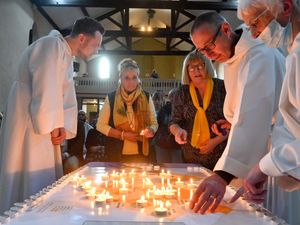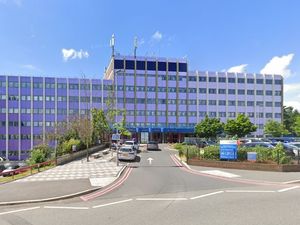Patients with throat cancers could have them removed by robot surgery in first for the Black Country
Patients with small throat cancers can now have them removed by robotic surgery in Wolverhampton – in a first for the Black Country.

It is hoped around 20 patients per year from Wolverhampton, South Staffordshire and Walsall will benefit from this surgery at New Cross Hospital, which is run by The Royal Wolverhampton NHS Trust (RWT).
Shorter time in surgery and recovery, reduced anaesthetic, and less time in theatre – leading to more capacity for more cases – are among the benefits.
Robotic surgery to remove urological and colorectal cancers has been performed at RWT since 2011.
The same robot, called 'Da Vinci', is used to remove throat cancers as in urological and colorectal cases, but with different arms.
Syed Farhan Ahsan, consultant ear, nose, throat (ENT) surgeon at RWT, has led this development with the assistance of John Murphy, consultant ENT surgeon and divisional medical director at RWT.
“As the Black Country centre for head and neck cancer, we are proud RWT is now offering robotic operations against this awful disease,” said Mr Murphy.
“We’ve gone from cases that might have taken 12 hours and two weeks in hospital to two or three hours with one or two days in hospital. There is less morbidity too.”
Patients with cancers that are small in volume and localised are suitable for this surgery. They are assessed clinically and scanned.
“We’re performing robotic surgery on cancers amenable to excisions in the throat without any major surgery,” added Mr Ahsan.
“People used to have surgery by dividing the mandible (lower jaw) but we can now do it through the mouth with the robot.
“The patient is able to eat and drink almost straight away, and when you reduce the anaesthesia time, the risks are lower so it’s better for the patient. They recover very quickly too.”
Normally these cancers are treated with chemotherapy and radiotherapy, but if the tumour is removed, chemotherapy can be avoided and treatment can be continued with radiotherapy, significantly reducing long-term side-effects.
Mr Ahsan had to undergo three months’ training with Intuitive, the manufacturers of the Da Vinci robot at New Cross Hospital, before he was signed off to operate.
He also had to be signed off by a proctor – a fellow consultant who evaluates his cognitive and technical skills.
In future it is hoped the service will be extended to suitable candidates from Shropshire and Sandwell too.





